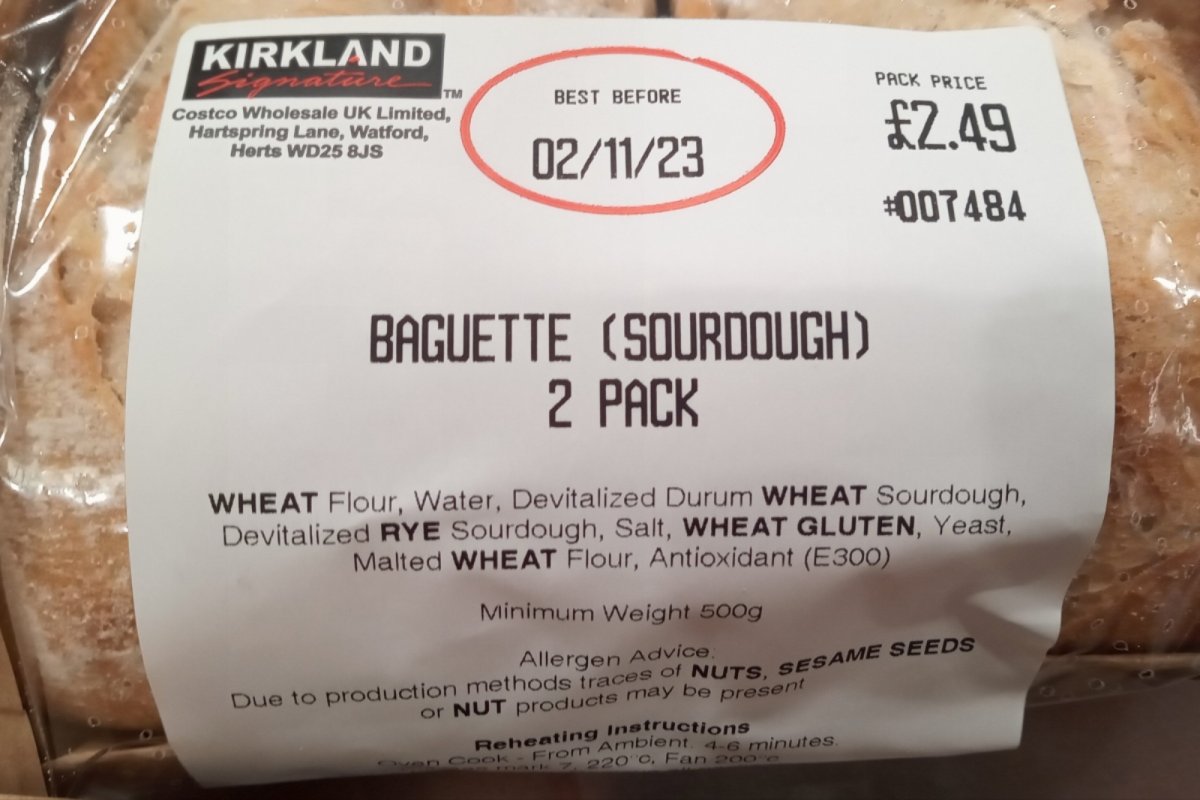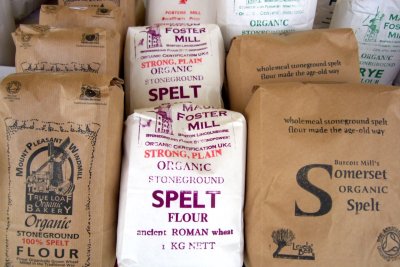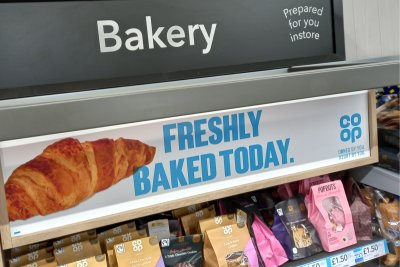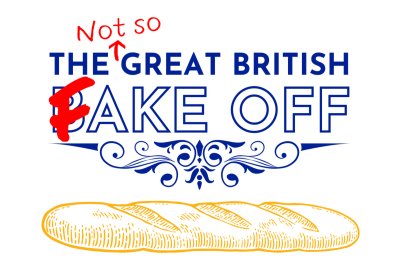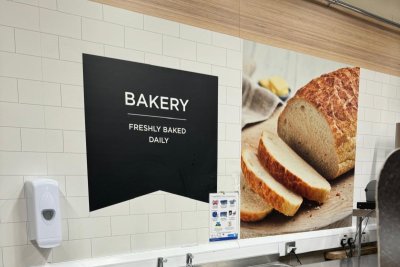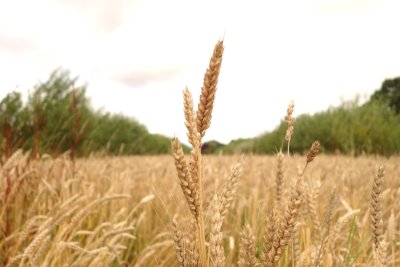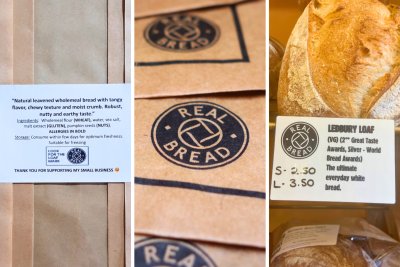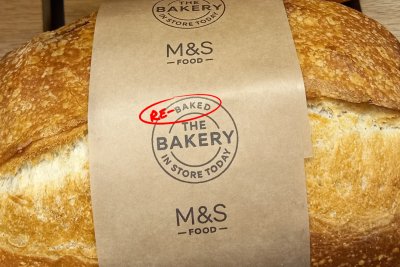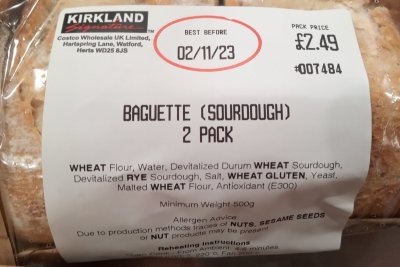 Costco sourfaux. Credit: Open Food Facts, CC-BY-SA
Costco sourfaux. Credit: Open Food Facts, CC-BY-SA
On 18 December 2023, Real Bread Campaign supporter Anne Keenan (The Culinary Kiwi Bird) complained to the trading standards department of their local authority (Aberdeenshire County Council) about a product in Costco's ‘Kirkland Signature' range.
The ingredients declaration on the product was: Wheat flour, water, devitalized durum wheat sourdough, devitalized rye sourdough, salt, wheat gluten, yeast, malted wheat flour, antioxidant (E300).
Despite the omission of a live starter culture, and the use of baker’s yeast and an additive, Costco marketed the product using the word sourdough.
Initial response
On 11 January 2024, A senior environmental health officer at Aberdeenshire County Council wrote: ‘During my visit to the store yesterday, I also investigated your complaint. I viewed the product and obtained a copy of the technical data sheet from the producer in France.
It would appear that the yeast in question is produced via a “starter” in the ingredients that creates the “wild” yeast. While I appreciate that the traditional method of production utilises a starter to create wild yeast, there are of course some producers that use commercial yeast in addition to the “starter” in Sourdough to improve the “rising” reliability. Therefore, both methods are acceptable given the apparent recognised use of both methods of production.
Whether the producer decides to use the starter method only, or with added yeast or only use commercial yeast will be an individual choice. Albeit, if the sourdough was labelled as “Artisan” I would expect, rather than require, it to be produced using a starter rather than commercial yeast.’
On 12 January 2024, the Real Bread Campaign replied to this response, which had been passed to us by Anne Keenan.
Updates
5 June 2024: We replied to Herts CC: 'While it now appears from the Costco website that, following our complaint, the company might not currently be selling the original product, it does still profit from using the word sourdough to market products manufactured with baker’s yeast. In the case of Menissez Sourdough Baguettes, Costco charges a premium (50.32p per 100g) for them, compared to products marketed without the word sourdough (33.25p per 100g).
Products the company markets using the word sourdough also include a 30-piece case of baguettes in its deli section. If Costco tries to defend this by saying they insert the qualifier ‘with’, please note that sourdough is a process. You can’t have fortified wine ‘with solera’ or whisky ‘with Scotch’, and you can’t have bread ‘with sourdough’. It’s either sourdough bread because it was made by the sourdough process, or it was made by a different process using additional leavening/raising agents and so is not sourdough bread.
The screenshot you sent refers to a company called Puratos, whose own ‘knowledge base’ makes clear the distinction between sourdough bread, and bread made using baker’s yeast: www.puratos.com/knowledge-base/what-is-the-difference-between-yeast-based-bread-and-sourdough-bread
www.puratos.com/knowledge-base/in-what-types-of-bread-is-sourdough-used
Furthermore, dictionary definitions of sourdough do not include the use of baker’s yeast:
- Oxford: 'dough (= a mixture of flour and water) that is left to ferment so that it has a sour taste, used for making bread; bread made with this dough'
- Cambridge: 'a mixture of flour and water that is left to ferment (= change in a chemical process) and then used to make bread'
As you know, Regulation (EC) No 178/2002 states that ‘it is a general principle of food law to provide a basis for consumers to make informed choices in relation to food they consume and to prevent any practices that may mislead the consumer.’ Regulation (EU) No 1169/2011 requires that ‘food information shall not be misleading, particularly: (a) as to the characteristics of the food and, in particular, as to its nature, identity, properties, composition, quantity, durability, country of origin or place of provenance, method of manufacture or production.’ Using the word sourdough to market product made using baker’s yeast is misleading and so breaches these regulations.
Your screenshot also refers to a so-called 'UK Baking Industry Code of Practice for the Labelling of Sourdough Bread and Rolls'. It was written by a group of organisations led by The Association of Bakery Ingredient Manufacturers (ie companies that manufacture and sell additives), The United Kingdom Association of Producers of Yeast, and the Federation of Bakers (the industry body for loaf manufacturers, most of which use the ‘no-time’ Chorleywood Process). Clearly, these organisations and their members have vested interests in profiting from the marketing value of word sourdough by applying it to products manufactured by a quicker, cheaper process using baker's yeast and additives. As the Puratos page notes: ‘Unfortunately, the flavour development is less complex compared to traditional sourdough.’
The input of artisan bakers (the custodians of the UK sourdough bread renaissance) was rejected by the proposed code’s authors. The proposed code has not been adopted by the UK government or devolved administrations, and has been rejected by the majority of bakers who make sourdough bread.'
4 June 2024: Herts CC replied: 'In this case the sourdough comes from France. They are making it using the table photographed in the attachment. I understand what you are trying to say but there is no legal definition for ‘sourdough’ which makes it very difficult to say whether or not this is the correct use of the wording.
Please can you let me know what you disagree with in the photo and I will discuss the matter with my Food Team and our Public Analyst who will have the final say and can’t be challenged (except by another expert in court).
Costco have taken what they believe to be the best corrective action in line with what their supplier has said. Costco do not advertise or benefit from selling the bread with this description. They sell all sorts of bread and do not advertise sourdough bread.'
21 May 2024: We asked Herts CC for an update.
25 April 2024: We emailed the trading standards officers, asking for an update. They replied: 'Apologises that you were not aware of the outcome of this sooner. The complaint was closed in Jan after discussions with Costco. They agreed that the label was not correct and should read Baguette with sourdough. They have amended the label in conjunction with this. '
We responded:
'As I’m sure you’re aware, Regulation (EU) No 1169/2011 requires that ‘food information shall not be misleading, particularly: (a) as to the characteristics of the food and, in particular, as to its nature, identity, properties, composition, quantity, durability, country of origin or place of provenance, method of manufacture or production.’
To be clear, sourdough is a process. While a bit of dried, inert starter culture can simply be added to dough, ‘sourdough’ (and everything that meaningfully denotes and implies about its nature, identity, properties, composition and method of production) cannot.
The making of genuine sourdough bread involved a process of long fermentation of the dough using a live sourdough starter culture. It does not involve the use of additives, and the necessary biochemical changes to the dough necessary to produce genuine sourdough bread cannot occur to the same extent if the process is shortened by the addition of baker’s yeast or another raising agent – or at all if another acidifying agent (such as dried, denatured starter) is used instead of a live starter culture.
This appear to be a clear example of the manufacturer/retailer attempting to have its (non) sourdough cake and eat it. Please don’t let them get away with using the marketing value of the word ‘sourdough’ by inserting the weasel word ‘with’ to profit from marketing a fundamentally different product made by a fundamentally different process.'
20 May 2024: We emailed Hertfordshire County Council, asking for an update.
25 April 2024: We emailed Hertfordshire County Council and Aberdeenshire County Council, asking for one of them to reply with an update.
29 January 2024: ‘My apologies, having re-read the message I received from from Hertfordshire County Council, I now realise that he plans to update me following his investigations. “Thanks for the email. I will be in touch with our contact at Costco and discuss the issue with them and let you know what action we agree best.” On receipt of a reply, I will forward details to you. I will also ask him that I can pass on his contact details to you, if has not already made contact with you.’
26 January 2024: As we had not had any response from Hertfordshire County Council, we asked Aberdeenshire County Council the contact details they used so that we could follow up.
12 January 2024: Aberdeenshire County Council replied: ‘As the product is likely sold from all Costco premises, I have forwarded details of your concern, and email, to the Primary Authority that deal with Costco UK. They are based in Milton Keynes City Council. I also provided them with a copy of the products technical data sheet. The product is manufactured in France. I have requested that they respond to you directly. I would anticipate a response from an officer in the next few working days.’
12 January 2024: The Real Bread Campaign wrote to Aberdeenshire County Council:
I co-ordinate the Real Bread Campaign, whose network includes the majority of commercial sourdough bread bakers in the UK.
Campaign supporter [X] has alerted us to the case of Costco using the word sourdough to name and market a product manufactured using monocultured baker’s yeast and E300. We believe this to be an example of extended passing off, which has the potential to mislead shoppers and also to undermine the livelihoods and businesses of bakers who make genuine sourdough bread.
Why this matters
This is more than a subjective matter of taste and flavour. The making of genuine sourdough bread is a substantively different process that results in bread that is fundamentally different from baked goods made by other methods/processes.
There is an increasing general consumer awareness that genuine sourdough bread is significantly different to other baked products and a growing perception that it is in some way ‘better’. For many sourdough buyers, this is built around an understanding that it might be healthier, a belief underpinned by a growing body of evidence and driven by retailers, the media and even the NHS.
Some manufacturers seek to profit from this growing demand (sometimes using premium branding and charging premium prices) but without investing the time, knowledge and skill needed to make genuine sourdough bread. People are selecting such products with a reasonable expectation that they are purchasing something natural (additive free) and ‘better’ than, or at least substantively different to, other baked products. They need help from consumer protection bodies such as yours to ensure that they are getting what they (believe that they) are paying for.
What is genuine sourdough bread?
Rather than a flavour, look, style or trend, the sourdough process is the oldest way of leavening dough. Yeasts and bacteria are present all around us, including on the surface of wheat and other grains.
When grain is milled into flour, some of these diverse yeasts and bacteria are incorporated. Given suitable conditions, populations of yeasts and lactic acid bacteria (LAB) will thrive, multiply and can be nurtured into a sourdough starter culture. More flour, water and (if the baker chooses) other natural ingredients can then be added to a portion of sourdough starter culture to make a dough. Given sufficient time, the yeast cells will generate enough carbon dioxide to make the dough rise.
In the hands of a skilled, knowledgeable baker, the production of enzymes, organic acids and other substances by the yeasts and LAB during this long fermentation process can be controlled to have beneficial effects on the organoleptic properties (flavour, texture and aroma) of the resulting bread. This transformation cannot happen to the same extent if the fermentation time is shortened by the use of additional raising agents, such as monocultured baker’s yeast. In the absence of a live sourdough starter culture, it cannot happen at all.
Good (and even great) bread can be leavened using monocultured baker’s yeast alone or in combination with a sourdough starter culture, but neither process results in genuine sourdough bread and so should not be marketed as such. One comparison is that an excellent spirit drink can be produced in a short time, but could and should not be called whisky as it has not been created by the appropriate process. Similarly, adding a splash of whisky to neutral spirit is not sufficient for the word to be used to name or market a bottle of it.
Potential health benefits
A growing body of evidence suggests that there might be a range of health benefits of making bread by the sourdough process. The strains and concentration of yeast cells in a sourdough starter culture produce carbon dioxide at a slower rate than monocultured baker's yeast, meaning that dough made by a genuine sourdough process takes longer to rise. During this extended fermentation time, the LAB in particular cause biochemical changes in the dough that go beyond subjective improvements to the organoleptic properties of the resulting bread.
Published in the February 2021 issue of Trends in Food Science & Technology, Thirty years of knowledge on sourdough fermentation: A systematic review is based on an examination of 1230 peer reviewed research articles published between 1990 and 2020 on the subject of sourdough. Its authors note: “The most recent literature showed how the sourdough fermentation mainly increased mineral bioavailability, enabled fortification with dietary fibers, lowered glycemic index, improved protein digestibility and decreased the content of anti-nutritional factors.” Researchers have also found how sourdough fermentation can modify and reduce the proteins that trigger the coeliac response - see the appendix for links to selected studies.
The lactic acid bacteria in bread making are related to those that act as natural preservatives in the production of foods including some cheeses, sauerkraut, kimchi, yoghurt and charcuterie. While not a health benefit, LAB fermentation has been shown to slow staling and inhibit fungal activity, both useful in helping to reduce food waste.
Again, none of this can happen to the same extent if the fermentation time is shortened by the use of additional raising agents. In the absence of a live sourdough starter culture, it cannot happen at all. The Real Bread Campaign calls for more research to be funded and carried out on the potentially beneficial effects of sourdough fermentation. In the meantime, people who experience and seek such benefits for themselves need protection from being misled.
Supporting fair competition
Though making genuine sourdough bread is not the sole preserve of small-scale artisan bakeries, the majority of those doing so are indeed locally-owned SME bakeries, which support more jobs per loaf than larger, more automated baked products manufacturers. In common with other small, locally-owned businesses, these bakeries help to keep more money circulating in their local economies. These small bakeries are, however, being undercut by larger companies using terms such as sourdough to market fundamentally different products. Consumer protection bodies, such as yours, preventing shoppers from being misled by inappropriate use of the word sourdough will also help to create a more level playing field on which small, local, independent bakeries have a better chance of surviving and thriving.
In light of the above, will you please review your investigation and decision on the Costco case?
Real Bread Campaign: The Real Bread Campaign finds and shares ways to make bread better for us, better for our communities and better for the planet. Whether your interest is local food, community-focussed small enterprises, honest labelling, therapeutic baking, or simply tasty toast, everyone is invited to become a Campaign supporter.
Sustain
The Green House
244-254 Cambridge Heath Road
London E2 9DA
020 3559 6777
sustain@sustainweb.org
Sustain advocates food and agriculture policies and practices that enhance the health and welfare of people and animals, improve the working and living environment, promote equity and enrich society and culture.
© Sustain 2024
Registered charity (no. 1018643)
Data privacy & cookies
